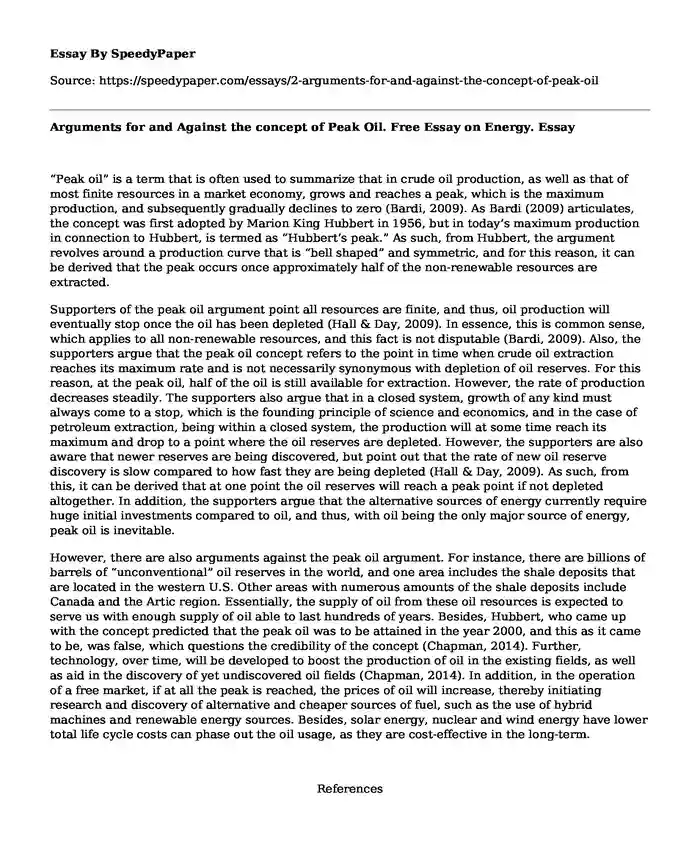“Peak oil” is a term that is often used to summarize that in crude oil production, as well as that of most finite resources in a market economy, grows and reaches a peak, which is the maximum production, and subsequently gradually declines to zero (Bardi, 2009). As Bardi (2009) articulates, the concept was first adopted by Marion King Hubbert in 1956, but in today’s maximum production in connection to Hubbert, is termed as “Hubbert’s peak.” As such, from Hubbert, the argument revolves around a production curve that is “bell shaped” and symmetric, and for this reason, it can be derived that the peak occurs once approximately half of the non-renewable resources are extracted.
Supporters of the peak oil argument point all resources are finite, and thus, oil production will eventually stop once the oil has been depleted (Hall & Day, 2009). In essence, this is common sense, which applies to all non-renewable resources, and this fact is not disputable (Bardi, 2009). Also, the supporters argue that the peak oil concept refers to the point in time when crude oil extraction reaches its maximum rate and is not necessarily synonymous with depletion of oil reserves. For this reason, at the peak oil, half of the oil is still available for extraction. However, the rate of production decreases steadily. The supporters also argue that in a closed system, growth of any kind must always come to a stop, which is the founding principle of science and economics, and in the case of petroleum extraction, being within a closed system, the production will at some time reach its maximum and drop to a point where the oil reserves are depleted. However, the supporters are also aware that newer reserves are being discovered, but point out that the rate of new oil reserve discovery is slow compared to how fast they are being depleted (Hall & Day, 2009). As such, from this, it can be derived that at one point the oil reserves will reach a peak point if not depleted altogether. In addition, the supporters argue that the alternative sources of energy currently require huge initial investments compared to oil, and thus, with oil being the only major source of energy, peak oil is inevitable.
However, there are also arguments against the peak oil argument. For instance, there are billions of barrels of “unconventional” oil reserves in the world, and one area includes the shale deposits that are located in the western U.S. Other areas with numerous amounts of the shale deposits include Canada and the Artic region. Essentially, the supply of oil from these oil resources is expected to serve us with enough supply of oil able to last hundreds of years. Besides, Hubbert, who came up with the concept predicted that the peak oil was to be attained in the year 2000, and this as it came to be, was false, which questions the credibility of the concept (Chapman, 2014). Further, technology, over time, will be developed to boost the production of oil in the existing fields, as well as aid in the discovery of yet undiscovered oil fields (Chapman, 2014). In addition, in the operation of a free market, if at all the peak is reached, the prices of oil will increase, thereby initiating research and discovery of alternative and cheaper sources of fuel, such as the use of hybrid machines and renewable energy sources. Besides, solar energy, nuclear and wind energy have lower total life cycle costs can phase out the oil usage, as they are cost-effective in the long-term.
References
Bardi, U. (2009). Peak oil: The four stages of a new idea. Energy, 34(3), 323-326.
Chapman, I. (2014). The end of Peak Oil? Why this topic is still relevant despite recent denials. Energy Policy, 64, 93-101.
Hall, C. A., & Day, J. W. (2009). Revisiting the Limits to Growth After Peak Oil In the 1970s a rising world population and the finite resources available to support it were hot topics. Interest faded—but it’s time to take another look.Am. Sci, 97, 230-237.
Cite this page
Arguments for and Against the concept of Peak Oil. Free Essay on Energy.. (2017, Nov 03). Retrieved from https://speedypaper.net/essays/2-arguments-for-and-against-the-concept-of-peak-oil
Request Removal
If you are the original author of this essay and no longer wish to have it published on the SpeedyPaper website, please click below to request its removal:
- Free Essay with Chemistry Problem Solving
- Free Essay on Over the Counter Pharmacology Mood Disorder Supplements at Walgreens
- The Affordable Care Act Essay Example
- Free Essay on the Key Points to Determine the Clinical History and Examination
- Team Communication and Problem Solving, Free Essay in HRM
- Impact of a Comprehensive Workplace Hand Hygiene Program - Article Review Paper Example
- Free Essay - Popular Cultural Representation of the Human Body
Popular categories





